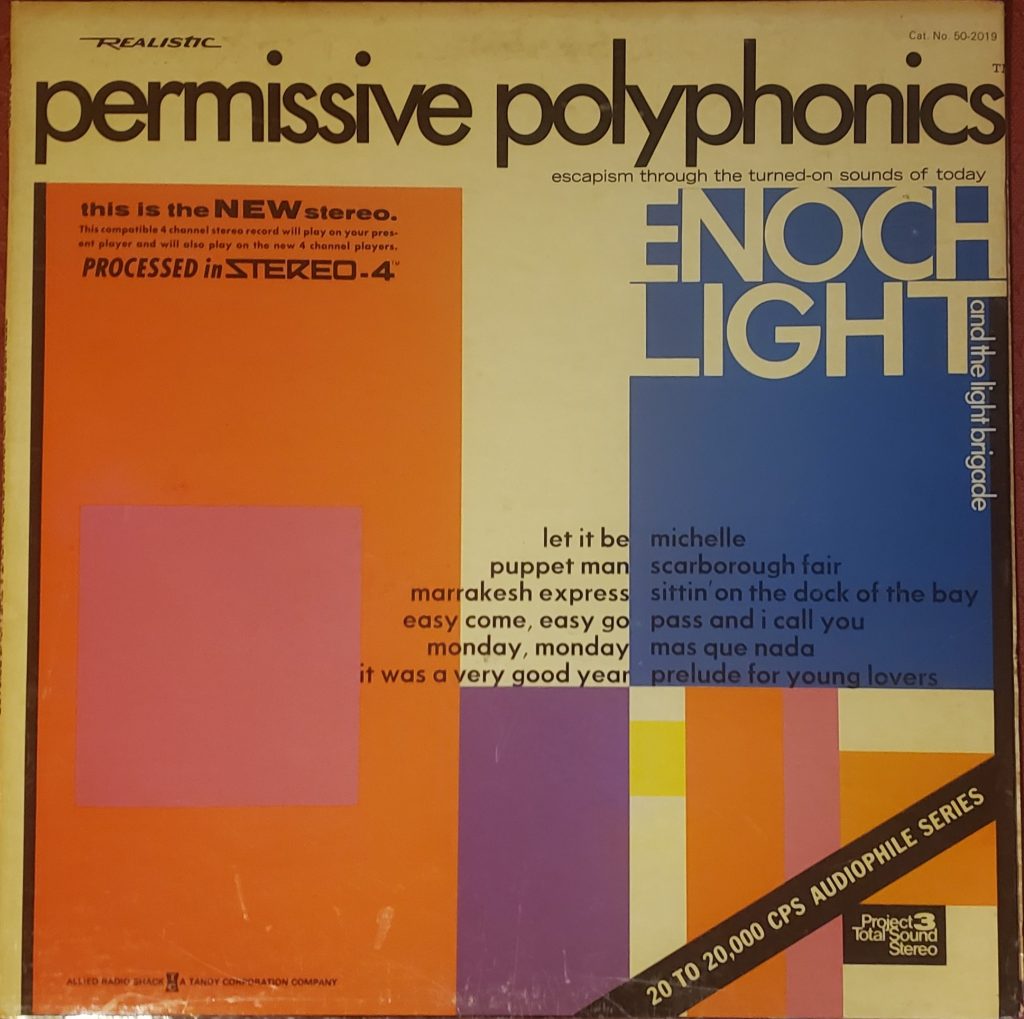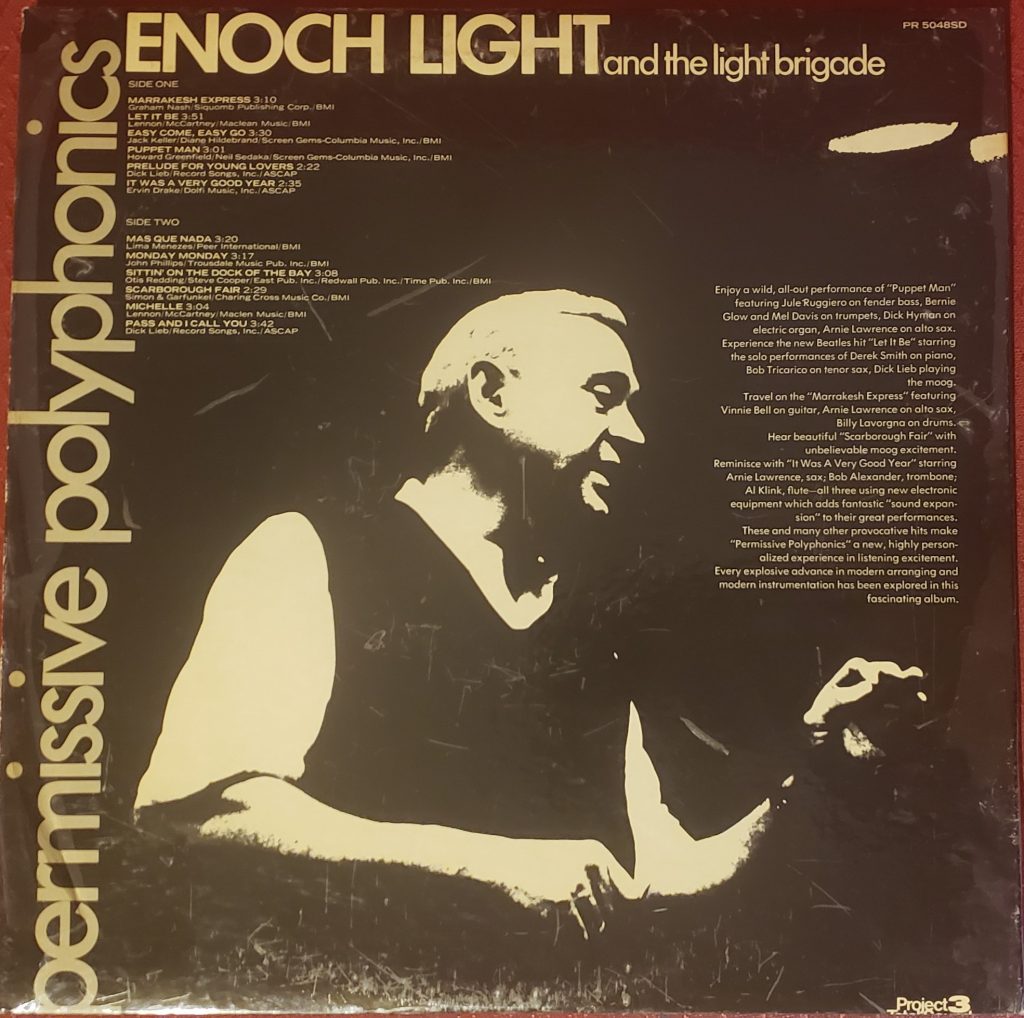Enoch Light and the Light Brigade – Permissive Polyphonics
The majority of my collection comes from what I affectionately call junk stores. Rarely are these the chain thrift stores (although these are where the majority of my hifi components were found), they are too picked over by high foot traffic. Junk stores are smaller, often the ground floor of an old house, or a regular sized downtown storefront. They are consignment or, more ideally, estate sale based. Locally, my favourite one is a bit of both. Which means it regularly gets interesting material, and I have a chance to find it. And today’s subject is quite curious.
This release of Permissive Polyphonics proudly advertises that it is processed in “the NEW stereo,” Stereo-4(tm). Stereo-4 was an abortive implementation of quadrophonic sound mainly backed by RadioShack/Tandy in North America. Which comes to why I purchased this LP, knowning nothing about it: the name Realistic sitting above the title. Collecting Realistic brand consumer electronics is a minor hobby of mine, even when their offering is inferior to other brands. So when I saw this LP, I knew it had to be mine.
Permissive Polyphonics has a catelogue number of 50-2019 on the front cover (Realistic catelogue number), and PR-5048QD listed inside (Project 3 Total Sound, the record label) and, confusingly, PR-5048SD on the rear cover. It has a copyright date of 1970. The label is based in New York. Album personnel are Enoch Light, executive producer; Tony Mottola and Jeff Hest, associate producers; Donald Hahn, recording engineer; Chuck Irwin, mixing; John Eargle, supervising engineer for four channel mixing; Phil Austin, mastering; and Dick Lieb, arrangements.


Side 1
Marrakesh Express (3:10)
Let it Be (3:51)
Easy Come, Easy Go (3:30)
Puppet Man (3:01)
Prelude for Young Lovers (2:22)
It was a Very Good Year (2:35)
Side 2
Mas Que Nada (3:20)
Monday Monday (3:17)
Sittin’ on the Dock of the Bay (3:08)
Scarborough Fair (2:29)
Michelle (3:04)
Pass and I Call You (3:42)
I had no expectations going into this album. My expectations were still, somehow, entirely wrong, I had no conception of what I was getting into. And I liked it, I liked it a lot.
This is mostly an album of covers, most of which I have not heard. I mainly remember my father listening to blues music and assorted styles from the ’20s and ’30s, and CBC Radio One was our radio station, so I missed out on a lot of classic rock. All this to say, I cannot compare many of these songs to their originals. Marrakesh Express is an energetic and fun song, enough so that I will be on the look out for the original. Puppet Man is a bit of psychedelic pop. It was a Very Good Year has a wonderfully ’70s sounding synthbass that really works for me.
Let it Be is bonkers. What I’m going to call the main instrumentation is fantastic, the vocals are pleasant and work well with what the main instrumentation is doing. And then there is the Moog. Without the Moog, this is a fairly faithful cover that captures enough of the original song’s inherent beauty. With the Moog it is the creation of an obvious madman, but a brilliant one. The strangest thing is that the synth and vocals never meet, losing out on a chance for beautiful but strange harmony. This song is beautiful madness and, if nothing else, I encourage everyone to listen once.
I am generally of the impression that electronic instruments belong in everything. Not always taking over everything, but rounding out the overall sound. Mas Que Nada balances this well to my ear. It is an enjoyable arrangement of an important and famous samba, made to fit in this collection through the application Moog.
My CBC Radio upbringing prepared me well to hear versions of Sitting on the Dock of the Bay, a song played regularly throughout the summer months. There is a long instrumental lead in to this song, and I like it. Like Mas Que Nada, I feel like they nailed the arrangement, mixing traditional and electronic instruments. And, like Let it Be, there are some harmonized vocals, but unlike that song, they do not suit the sound.
Many of the songs feel simultaneously deeply of their time and surprisingly contemporary. Scarborough Fair would not be out of place opening for Belle and Sebastian, at least to my ear. The vocals on Monday Monday would fit on a shoegaze song (and is so different from the original that I failed to recognize it). Others, such as the final Pass and I call You, are deeply of their own time.
This is a strange album. The abandoned quadraphonic format. The electronics company labeling. The improbable name of the artist. There is more than enough good here to outweigh the unpleasantly weird. And that is mostly what I hope to get out of these junk store finds: something a bit strange and worth talking about. The album sleeve advertises other, similar collections by Enoch Light, and I know I would be excited to find any of them, but especially Movie Hits ’68 ’69 where Mrs. Robinson, The Good, The Bad and the Ugly, and the lullaby from Rosemary’s Baby are covered. This album is now part of my permanent collection, and I am thankful for it.
One Reply to “Enoch Light and the Light Brigade – Permissive Polyphonics”